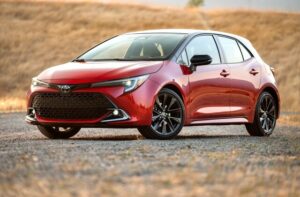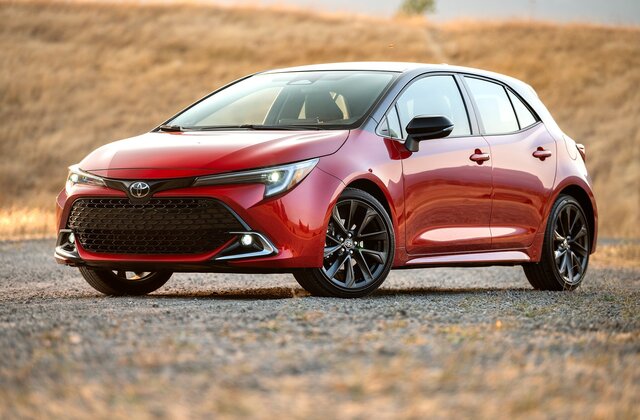An electric car is a type of vehicle that is powered by one or more electric motors, using electrical energy stored in rechargeable batteries. Unlike traditional gasoline-powered cars, electric cars do not rely on internal combustion engines or fossil fuels to generate power. Instead, they use batteries to store electrical energy, which is then used to power the electric motor(s) that propel the vehicle.
Electric cars, also known as electric vehicles (EVs), are a type of vehicle that uses one or more electric motors for propulsion, instead of a traditional gasoline or diesel engine. Electric motors are highly efficient and have the advantage of producing instant torque, which means they can accelerate quickly and smoothly. In addition, electric cars have regenerative braking systems, which capture energy that would otherwise be lost during braking and use it to recharge the battery.
The batteries used in electric cars are typically lithium-ion batteries, similar to those used in laptops and smartphones. These batteries are rechargeable and can be charged using a variety of methods, including standard household outlets, dedicated electric vehicle charging stations, or fast-charging stations.
In this article, we are going to explain the pros and cons of electric cars in full details.
Pros of electric cars
Electric cars are rapidly becoming a popular alternative to traditional gas-powered vehicles. There are many benefits to owning an electric car, both for the environment and for the individual driver. In this response, we will discuss the many pros of electric cars in detail.
- Environmentally friendly: One of the most significant benefits of electric cars is that they are much better for the environment than traditional gas-powered cars. Electric cars produce zero emissions, which means that they don’t contribute to air pollution. This is especially important in urban areas where air pollution is a major problem.
- Lower greenhouse gas emissions: In addition to producing zero emissions, electric cars also have much lower greenhouse gas emissions than traditional gas-powered cars. This is because they use electricity, which can be generated from renewable sources such as wind and solar power.
- Lower fuel costs: Electric cars are also much cheaper to operate than traditional gas-powered cars. Electricity is much cheaper than gasoline, so electric car owners can save a significant amount of money on fuel costs.
- Low maintenance costs: Electric cars are also cheaper to maintain than traditional gas-powered cars. They have fewer moving parts, which means that there is less wear and tear on the vehicle. Electric cars also require fewer oil changes and other routine maintenance tasks, which can save owners a significant amount of money over time.
- Quieter operation: Electric cars are much quieter than traditional gas-powered cars. This is because they don’t have a loud engine, and they don’t produce exhaust noise. This can make for a more pleasant driving experience, especially in urban areas where noise pollution is a problem.
- Instant torque: Electric motors provide instant torque, which means that electric cars can accelerate quickly and smoothly. This can make for a fun and exhilarating driving experience.
- Regenerative braking: Electric cars also have regenerative braking systems, which means that they can convert some of the energy lost during braking into electricity. This helps to recharge the car’s battery, and can improve overall efficiency.
- More efficient: Electric cars are also more efficient than traditional gas-powered cars. Electric motors convert a much higher percentage of the energy stored in the battery into actual movement, which means that they can travel farther on a single charge.
- Increased range: Advances in battery technology have led to an increase in the range of electric cars. Some newer models can travel up to 300 miles on a single charge, which is more than enough for most people’s daily needs.
- Reduced dependence on oil: Electric cars can also help to reduce our dependence on oil. Because they don’t require gasoline, they can help to reduce our reliance on foreign oil and improve our energy security.
- Reduced noise pollution: In addition to reducing air pollution, electric cars can also help to reduce noise pollution. This is because they are much quieter than traditional gas-powered cars, which can make a big difference in urban areas.
- Improved public health: By reducing air pollution and greenhouse gas emissions, electric cars can also improve public health. This is especially important for people with respiratory problems or other health issues that can be exacerbated by air pollution.
- Lower carbon footprint: Electric cars have a much lower carbon footprint than traditional gas-powered cars. This is because they produce fewer greenhouse gas emissions and use electricity that can be generated from renewable sources.
- Tax incentives: Many governments offer tax incentives and other incentives for people who purchase electric cars. This can help to reduce the overall cost of ownership and make electric cars more affordable for everyone.
- Enhanced driving experience: Finally, electric cars can provide an enhanced driving experience. With instant torque, regenerative braking, and smooth acceleration, electric cars can be a lot of fun to drive. They also offer many advanced features and technologies that can make driving safer and more enjoyable.
Cons of electric cars
Below are the disadvantages of electric cars.
- Limited Driving Range: One of the main disadvantages of electric cars is their limited driving range. Most electric vehicles have a range of around 100-300 miles on a single charge, which can be a significant inconvenience for long-distance driving.
- Long Charging Times: Another major drawback of electric cars is the long charging times. Charging an electric car can take anywhere from 30 minutes to several hours, depending on the charging station’s power and the vehicle’s battery capacity.
- High Upfront Costs: Electric cars are typically more expensive than their gasoline-powered counterparts. This is mainly due to the high cost of the battery and electric drivetrain technology. The price difference can be significant, making electric vehicles less accessible to many consumers.
- Limited Availability of Charging Stations: Despite the increasing popularity of electric cars, charging infrastructure is still limited, especially in rural and remote areas. This can make it difficult to find a charging station when you need it, and it can be frustrating for electric vehicle owners.
- Heavy Weight and Limited Cargo Space: Electric cars are generally heavier than gasoline-powered cars due to the weight of the battery pack. This can make them less maneuverable and can also limit the amount of cargo space available.
- Dependence on Electricity Grid: Electric cars are reliant on the electricity grid, which can be a disadvantage in areas with unreliable power supply. Power outages or natural disasters can disrupt charging and limit the vehicle’s range.
- Limited Driving Experience: Electric cars can be quieter and smoother than gasoline-powered cars, but some drivers may find them less exciting to drive. The lack of engine noise and traditional shifting can make the driving experience feel different and less engaging.
- Battery Life and Replacement Costs: The battery is a critical component of electric cars, and its lifespan can be affected by factors such as temperature, charging frequency, and depth of discharge. When the battery needs to be replaced, it can be expensive and time-consuming.
- Limited Variety: Compared to gasoline-powered cars, the variety of electric car models is still limited. This can make it challenging to find a car that meets your needs and preferences.
- Environmental Concerns: While electric cars are often touted as a more environmentally-friendly alternative to gasoline-powered cars, their production and disposal can still have negative environmental impacts. The mining of lithium for batteries can be environmentally damaging, and the disposal of used batteries can also be a concern.
- Range Anxiety: Electric car drivers can experience anxiety about running out of charge, commonly referred to as “range anxiety.” This can limit the freedom and flexibility of driving an electric car and can be a significant disadvantage for some drivers.
- Lack of Public Awareness: Despite the growing popularity of electric cars, many consumers are still unaware of their benefits and limitations. This lack of public awareness can make it difficult to promote and encourage the adoption of electric vehicles.
- Technical Challenges: Electric cars are still a relatively new technology, and there are ongoing technical challenges that need to be addressed. For example, the development of fast-charging technology and the improvement of battery lifespan are ongoing challenges.
- Limited Supply Chain: The supply chain for electric cars is still developing, and there can be supply chain bottlenecks that limit the availability of key components such as batteries and electric drivetrains.
- Maintenance Costs: While electric cars can have lower maintenance costs than gasoline-powered cars due to fewer moving parts, there are still maintenance costs to consider. For example, the battery may need to be replaced, and repairs to the electric drivetrain can be expensive.
- Impact on the Electrical Grid: As more electric cars are added to the road, there is concern about the impact on the electrical grid. The increased demand for electricity could lead to strain on the grid, especially during peak hours.
Conclusion
Electric cars have many pros and cons, just like any other type of car. Some of the pros of electric cars are that they are environmentally friendly, they are cheaper to operate than gas cars, and they can help reduce air pollution. However, there are also some cons to electric cars. One con is that they take longer to charge than gas cars, and they can be more expensive to buy than gas cars. Other cons include the fact that they can be less reliable in cold weather, and they can be less safe in accidents than gas cars as it’s all listed above. Overall, electric cars are an interesting option that have a lot of benefits and drawbacks, just like any other type of car.












+ There are no comments
Add yours